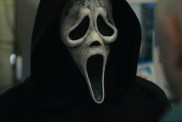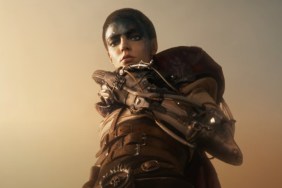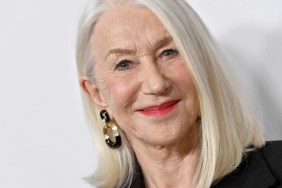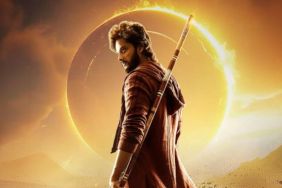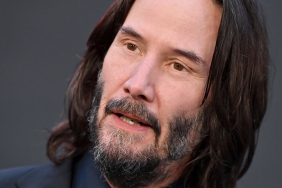Passengers director Morten Tyldum takes us behind the scenes of his science fiction romance
From Morten Tyldum, the director behind the acclaimed Norwegian crime thriller Headhunters and the Academy Award-winning Alan Turing biopic The Imitation Game comes Passengers, an original science fiction adventure scripted by Doctor Strange scribe Jon Spaihts and starring Chris Pratt and Jennifer Lawrence. A Sony Pictures release, Passengers hits the big screen this Wednesday, December 21 and we’re continuing our behind-the-scenes look at the film in a conversation with Morten Tyldum himself.
RELATED: Screenwriter Jon Spaihts on Passengers’ Long Journey to the Screen
Set in a future where humanity has started to colonize other worlds, Passengers follows Jim Preston (Pratt), a humble mechanic who decides to take the 120-year journey to the newly-settled colony Homestead II. Unfortunately for Jim, something goes wrong with his suspended animation chamber and he finds himself awake 90 years too early. With no way of going back to sleep, Jim is forced to face spending the rest of his life alone. That is, until another passenger wakes up.
CS: When did “Passengers” come your way?
Morten Tyldum: I had a meeting with [Michael] De Luca at Columbia Pictures about another movie that I wasn’t a hundred percent sure I was going to do. They wanted to be part of it and they wanted to finance the movie, so we talked about that movie for an hour and a half. Then, as I was about to leave, he said, “By the way, I just got this script that I really like. Want to take a look at it?” That is what I think is the blessing of this job. You never know where your next movie is going to come from. You just have to fall in love with something, because it’s going to be taking up every moment of spare time in your life for about two years. You’re going to be dreaming about it and thinking about it and becoming obsessed with it. You need it to be something that triggers you and you never know what that’s going to be. For this one, it was something about the characters and their dilemma. There’s the solitude and the love story. I’m such a romantic at heart. At the same time, we’re making a movie that is so intimate and that still has this scale. I’m a sci-fi fan, but a lot of the sci-fi you’re getting is the same. It’s very stereotypical. This felt like something very original. I could create a phenomenal spaceship, which was so fun. It was so, so fun to do that from scratch, thinking about the mechanics of it and how it all works. Why did they build it like this? Why does it work like it does? We had to create something futuristic, but that also goes back in time in a way. It’s very Art Deco influenced. It was just a great project. I think that the test for taking on a project is to try and list all the reasons not to do it. When you find yourself running out of reasons and you still have to do it, it’s the right thing to do.
CS: Do you have a favorite part of the filmmaking process?
Morten Tyldum: There’s two parts: Developing the script and developing the design of the film. It’s like everything is possible. You have to live with the character and sort of figure out who they are. Then designing all the elements is such a great time. It’s a lot of hard work getting it all on film. It’s painful. It’s sometimes a lot of fun, but it’s also a lot of pain and stress. But I also love when the editing is done and you’re sitting there in the dark doing the final mix. The movie is cut and the music recorded. Then everything comes together. You’re sitting there with just a few people in a big mix theater, finalizing everything. That’s when I really see the movie. When there’s an audience, I’m stressed out. I can’t help but trying to watch everyone’s reaction. Those moments, though, when the movie is just paper and then, finally, when all the pieces come together, you’re sitting there in the dark and seeing the movie. Those are magical moments for me and those are what makes it all worthwhile.
CS: It seems like the science side of the film is very thoroughly considered.
Morten Tyldum: It was so fun to go and come up with some of these ideas. So it’s four months before people start arriving at Homestead II that they are supposed to be woken up. They want them to prepare for life on the colony planet. Part of it is mentally, but they also want them to spend money. It’s future money. They can’t spend any money they have. They arrive in debt. They are borrowing company money when they set foot on the planet. They will have to pay back that debt there. There was lots of thoughts about how that would work and a lot of it was based on how immigrants came to America. The trip cost so much money that they were already in debt at that point. It was fun to design part of the ship as very luxurious. It’s all very practical. The actual design came from a trip to Alcatraz. Our production designer, Guy Dias, wanted to explore places where you felt claustrophobic and confined. The ship that takes you Alcatraz has this antennae aboard. He took a picture of it and said, “Wouldn’t that be a cool spaceship?” So that was how the rotating blades and everything came about.
CS: The film opens with Bob Dylan’s “Like A Rolling Stone.” How did you wind up picking Dylan?
Morten Tyldum: It was really hard. You have to ask, “What kind of artist is going to survive really far into the future?” We tried all kinds of music and I didn’t want any kind of contemporary music. Bob Dylan is someone that — I don’t care how long into the future it is — somebody will still play Bob Dylan. He will always survive. Thematically, too, “Like a Rolling Stone” is perfect. This guy is lost. He’s far away from home with no direction home. It just fit really well to play that as the first music you hear. Those little Easter eggs are so fun to put into the movie. There’s a level of nostalgic sci-fi, having crooner like Frank Sinatra and then Bob Dylan. It’s a movie that both looks backwards and forward and I think that makes it feel like its own time.
CS: Because Jim Preston does some questionable things, he’s not exactly the hero of the story. Was there anything done in the editing room to make sure he stays likable despite his failings?
Morten Tyldum: No, I went all in. It was a big question about whether or not we had any backup plans. I wanted to own it. I don’t want to shy away from him making some dark and drastic decisions. I want people to be a part of that journey and really understand why he did it. I don’t think that there’s anyone who could say for sure that they would not have done the same thing. That is the big thing and I want that to be the conversation when people leave the cinema. I think I would have done it and I think most people would have done it. And I think that Jen [Lawrence]’s character understands it by the end of the film. It’s a movie about love and forgiveness. I think it’s important not to shy away from dark choices. It’s so human. That is one of Chris [Pratt]’s great skills as an actor. You can really relate to him. You can really understand the process he goes through. I think it’s important to really own those moments and let it be unforgivable.
CS: Stanley Kubrick is obviously a huge influence on the look of “Passengers.”
Morten Tyldum: In every Kubrick movie, there is so much great thought put into the surroundings. It’s almost like the sets are huge characters in the movie at all times. Think of the opening of “A Clockwork Orange” at the milk bar or “2001” and “The Shining” where everything is about the location and the setting. I have a few moments in the film that are very distinct Kubrick references where I literally took part of his films — the design elements — and said, “I want that.”
CS: One of the other films that “Passengers” reminded me of is Lina Wertmüller’s original “Swept Away.”
Morten Tyldum: Okay, yeah. You’re not the first person to mention that. That wasn’t a film that I thought about while making it, but I can see why it reminds you. There’s a strong contrast between the two. It’s also so intimate that you could have written it as somebody trapped in a room. Then you can also do this epic version where you have this whole world created on a spaceship. That’s something that was very challenging, but also very fun. To combine something huge and epic, but also very intimate.
CS: One of the other sides to the future of “Passengers” is that it’s controlled largely by automation. I think most of us have been stuck dealing with automated customer service lines in the present and can relate.
Morten Tyldum: We wanted to create a ship that serves people like everything does now. It’s automatic and supposed to function a certain way. You’re supposed to wake up at a certain time and you’re supposed to do certain things. So what happens when it’s not? I think that’s very interesting. Something that I was also very fond of is Michael Sheen’s character who, in many ways, is the smartest character in the movie. He has life wisdom without having a life in a weird way. He’s struggling to understand and he has his parameters. He has a limited AI function that’s supposed to be for dispensing bartender wisdom, but he’s the one that speaks to the heart and soul of the movie. The actual message of the film comes from this bartender. It’s so hard to make something human that is non-human. Michael just balanced it so perfectly and I think audiences feel for him even though he’s an android. His comedic timing is perfect and it’s very, very hard to pour drinks and mix bottles while making it seem effortless while being pushed back and forth on this electric railroad system. It was just crazy
CS: Do you know what’s next for you?
Morten Tyldum: I thought I knew, but now I don’t know anymore. This has been an extraordinary experience, but it has also been exhausting. I’m also now finishing up the first episodes of a new TV series for STARZ, which has been great fun to do. It’s great to try another format and be part of telling a story over ten episodes. Then I’ll figure out what the next movie will be. Like I said, you don’t find your movies. You fall in love with it. I have no idea if it’s going to be another sci-fi or another period or contemporary or a thriller. Someone just told me, “You’ve done three movies and they’re all totally different.” Between “Headhunters,” “The Imitation Game,” and “Passengers,” I’m really proud of that. They feel and taste very differently. You find a story — or more importantly, you find some characters — that you want to be around as a filmmaker. The style and how we’re going to shoot it and how we’re going to design it and how it’s all going to feel and look depends on that story. They tell me how I should shoot it.

